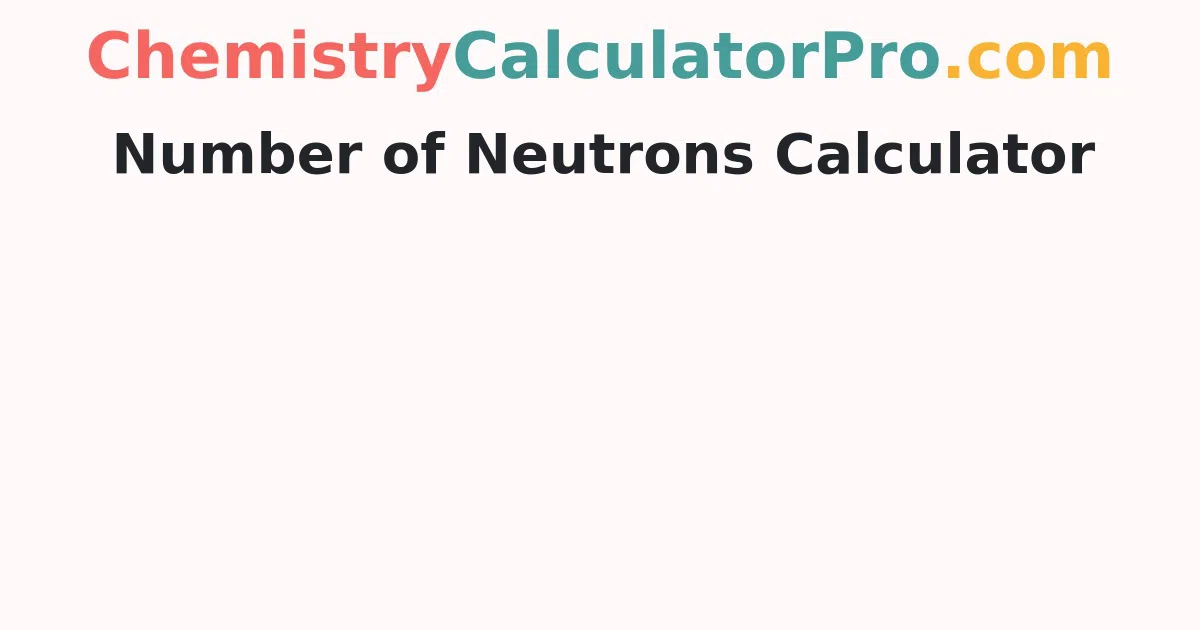Number of Neutrons Calculator
Neutrons are the neutrally charged particles in an atom. They are the biggest of the atom's constituent components. The isotope of an atom is determined by the number of neutrons in it. Our free online number of neutron calculators gives a detailed explanation of the term related to neutron, how to find out the number of neutrons, etc.
What does the term Number of Neutrons mean?
The number of neutrons is equal to the difference between the atomic mass number (A) and the atomic number (Z), and is written as n0 = A-Z or mass number-atomic number. The sum of protons and neutrons in an atom of an element is the mass number, while the number of protons inside the nucleus of an atom of an element is the atomic number.
Number of Neutrons Formula
The number of neutrons (n) in a given nucleus is determined by the difference between the mass number (A) and the atomic number (Z): n = A - Z. A neutral atom has the same number of electrons and protons as a positively charged atom. The number of protons in a neutral atom is equal to the number of electrons.
Number of neutron = Mass number - Atomic number i.e. n0 = A - Z
Where,
- n0 = Number of neutron
- A = Mass number
- Z = Atomic number
How to Calculate Number of Neutrons?
The following procedure is used to calculate the number of neutrons:
- Step1: The number of neutrons calculator calculates the number of neutrons using the formula number of neutrons = Mass number-Atomic number.
- Step 2: The difference between the atom's mass number (A) and the atomic number (N) equals the number of neutrons (Z).
- Step 3: The n0 sign represents the number of neutrons.
How do I use the Number of Neutrons Calculator?
The following is the procedure how to use the number of neutron calculator:
- Step 1: Enter the mass number (A) and the atomic number (Z) into this online calculator to find the number of neutrons.
- Step 2: Here's how the computation for the number of neutrons can be described using the supplied input values: 37-17 = 20.
FAQs on Number of Neutrons
1. What factors have to be considered the value of protons and neutrons?
The number of protons in the nucleus determines the position of an element in the periodic table. The electric charge of an atom is influenced by electrons. Subtract the atomic number (which equals the number of protons) from the mass number to get the number of neutrons.
2. Which of the following atoms contains the most neutrons?
It's a split between livermorium and Tennessee for the atom with the most neutrons. There are 177 neutrons in each of these atoms.
3. Is it true that neutrons are neutral?
Every atomic nucleus, save simple hydrogen, contains a neutron, a neutral subatomic particle. It has no electric charge and a rest mass of 1.67493 10^-27 kg, which is slightly higher than the protons but roughly 1,839 times more than the electrons.
4. Which of the following properties does not belong to the neutron?
A negatively charged particle that travels in the space around the nucleus is called an electron. To put it another way, it exists outside of the nucleus. The mass of a neutron is quite small. This property does not apply to neutrons.
